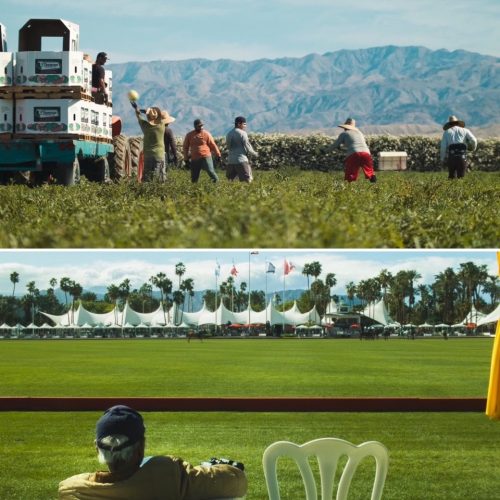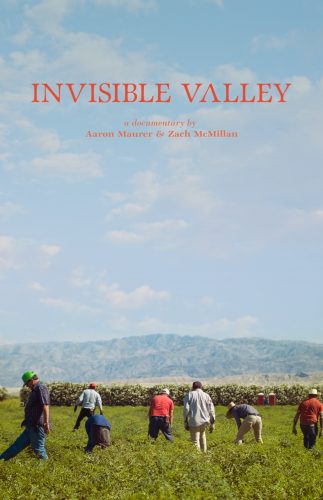INVISIBLE VALLEY
Santa Barbara International Film Festival 2021
Directors: Aaron Maurer and Producer: Zach McMillan
Interviewed by Emmanuel Itier and Roxanna Bina
Q: Tell me how this project came together and what was the idea behind it?
Aaron: It came together as the request to show the world of migrant workers. We live in New York and, at first, we were not sure we could tell that story. But we felt we could look at the story of migrant workers in relation to other communities in the Coachella valley. By pulling back we could then see how everything and everybody inter-act with each other. This gave us a fresh take on things.
Zach: We have been going to that area for a long time. A long time ago, Aaron and I attended the famous Coachella music festival. And always, things sneak through the cracks at this festival, and you get these glimpses of various different sides of the Valley. For most people who don’t live in California, they see the Coachella valley as just gold resorts and Palm Spring and mid-century architecture as well as festivals and a party place. But this is a tiny part of this place. Very specifically, our executive producer Mary is one of the “snow-bird”, a person going there during the winter. One day she found in her church bulleting something called: “read with me”. It was a literacy advocacy program and it opened her eyes to this whole other world. A lot of the students came from migrant workers families. And she engaged with them. She couldn’t believe she was unaware for so long. And she, then, approached us with the idea of a short documentary or a film to raise awareness in order to cultivate a change. And, of course, it was quite complex for us, two white guys, to tell the stories of these migrant workers.
Q: What was the biggest awakening for you, what did you learn that surprised you the most with this world?
Aaron: The film covers a wide range of topics and therefore, we learned a lot making this film. Foremost we learned about the conditions migrant workers face on a daily base. It was quite eye opening to see these people working in the field before dawn, with temperatures going up to 110 degrees, and at the end of the day having to go to sleep on the ground next to their car on a parking lot! Just the lack of resources that these people have in spite of being essential workers is shocking. After decades of generations of migrant workers there is still so little support for them. The contrast in this valley is quite surprising, going from the lavish Country clubs to the East side to watch people eating on the ground.
Q: What was the biggest challenges you faced making this film?
Zach: It was for sure a real learning curve making this Documentary. The most difficult challenge we needed to be resilient to was navigating so many “no” and so many accesses being shut down or denied. You can imagine the reactions we got sometimes as two strangers coming with cameras in a parking lot where you have some people who might be undocumented. It’s not met with open arms necessarily. Same thing with wealthy people who can be not so welcoming. Also,, some of the farm owners who are multinational conglomerates were not so happy to see professionals film their environment. Lots of people didn’t see any upside giving us access to their real life. So, we faced lots of rejections. And this was the biggest challenge.
Aaron: It took time to get the trust of the various communities in the Valley. We had to show we were really engaged in these stories and the people telling them. One of the things we found is that, even if people were hesitant at first, in the migrant community, once they trusted us and let us in then they made us feel like being part of their families. And this was not the case with the wealthier communities. There was more trepidation in those rich circles of people.
Q: What impact do you hope this film creates?
Aaron: I hope it creates conversations. Our goal was to ask lots of questions and not so much provide answers as far as telling you what to do or what to think. We were trying to paint a picture of this place and ask questions such as: “what is the responsibility of awareness?”
Zach: We tried to avoid making a film that was prescriptive. We are not telling you what to do or what not to do. We wanted to avoid creating an obvious “villain”. We didn’t want to point a finger at the monster and at the oppressed parties. We tried to find more nuances in this conversation. The main theme is: “what do you see and what don’t you see”. And that’s your choice and it’s your responsibility to have if you attend a festival in this area. To look beyond what you see and try to discover the reality of the place you are visiting.
Aaron: We saw the valley as a macrocosm for something larger. Even so the movie is about a year in the life of the Coachella valley, there are “invisible valleys” all around us and all around the World. We hope that people beyond California can see how this translates into their lives wherever they live.
Q: Tell us about being part of the Santa Barbara film festival?
Aaron: We are so thrilled it’s premiered in Santa Barbara. And we are so happy they are doing “drive in” screening so there is a sense of inter-action with the audience. We can’t wait to come to Santa Barbara and meet our audience. This was the point of making this film, to spark discussions. And it’s also fantastic to have virtual screening in order to have more people discover our film.
Zach: I believe Santa Barbara is the perfect place to launch our Doc. Especially because the Palm Spring film festival didn’t happen this year. This is a place very relatable, in regard to the Coachella Valley. And you also have there a very influent community next to a very cultural community. Therefore, people in Santa Barbara can identify to our themes and our various characters painted in this film.
 Teacups & Couture A Fashion Blog by Roxanna Bina
Teacups & Couture A Fashion Blog by Roxanna Bina





